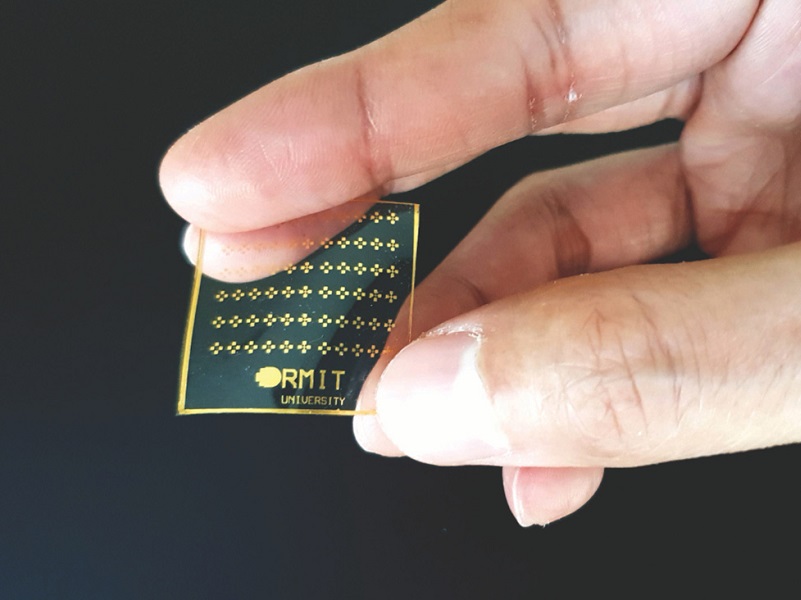There is fast moving technology revolution underway right now that has the potential to transform Australian industry — holding the promise of huge cost savings, massive productivity and improved energy efficiency.
Whether you are growing greenhouse tomatoes, creating superfast charging stations for electric vehicles or building energy efficient housing, there are rapid atomaterial advances that are creating new wealth. Right now, there is a global race to transform industries and for the companies, which are identifying the opportunities, the rewards will be stunning.
While Australian research can lead the world in the development of the next generation of nanomaterials, which have the potential to produce devices capable of charging an electric vehicle in minutes and cooling a house without electricity, the industry opportunity has arrived.
That’s the message of Distinguished Professor Baohua Jia, who is the inaugural director of RMIT University’s new Centre for Atomaterials and Nanomanufacturing (CAN).

Coined by Professor Jia herself, atomaterials refer to the use of tiny atom bricks — about one millionth the size of a human hair — to build up structures and devices with properties and functions not achievable before.
This can construct devices capable of being more powerful and more environmentally friendly than existing nanomaterials, which are fast approaching their limits.
The new centre at RMIT is focusing on the development of a series of prototypes using these atomaterials, and working closely with Australian industry to ensure the new technology has viable commercial potential.
CAN is actively developing prototypes designed for commercial viability, including rapid-charge energy storage devices, green hydrogen devices directly from seawater and innovative cooling solutions for agricultural and industrial applications. The centre collaborates closely with Australian government and industries, listening to industry requirements and providing research validation and material design, to ensure these technologies address real market needs.
“Atomaterials represent a once-in-a-generation opportunity,” says Professor Jia. “We’re working directly with industry to create materials that can redefine sectors like energy, agriculture, communications, and medtech. For Australian businesses, this means access to technology that can reduce costs, boost efficiency and sharpen their competitive edge.”
“Atomaterials can provide solutions to all the current frontiers of society — including quantum and renewable energy,” Professor Jia said.
On Thursday 28 November, the Building the Cornerstone of Australia’s Nano-Manufacturing Ecosystem Forum will be held at the Victorian State Library during the 2024 International Conference on Nanomaterial and Atomaterial Science and Applications (ICNASA). This free event marks the launch of CAN and offers industry leaders, investors and entrepreneurs insights into the profit potential of atomaterials.
“We’re not just theorising in a lab. We’re working with industry in our Open-labs both at RMIT sites and at the industry facilities to deeply interact with multiple industries and creating solutions that Australian businesses can implement today to stay ahead in a fast-changing market,” says Professor Jia.
“With atomaterials development enabled by nano-manufacturing capabilities, our goal is to pioneer atomaterial translation in the real life. The strategic tools enabled by this ‘tiny’ atotechnology are creating a future-oriented sovereign manufacturing leadership worldwide.”
The forum is free to attend and will also serve as the official launch of the centre. It will highlight the vast commercial potential of the atomaterials being pioneered by the CAN, and their ability to influence a huge range of sectors through live prototype demonstrations.
Attendees will hear from key industry figures, including:
- Frank Yao, chief executive and founder of Innofocus Photonics Technology, about how nanomaterials are solving challenges across sectors such as MedTech and agriculture
- Professor Hala Zreiqat, director of the ARC Training Centre for Innovative BioEngineering, who will share pioneering advancements in bioengineering that highlight atomaterials’ applications across health and medtech
- Professor Mark Osborn, Dean, School of Science at RMIT, sharing perspectives on atomaterials as a critical horizontal in industry applications
- Dr Mathew David, with extensive expertise in research translation and commercialisation at GrapheneX, discussing the intersection of research and industry needs
- Lorraine Maxwell (Chiroiu), bringing experience across MedTech, digital health, and Australia’s advanced manufacturing sector to discuss commercialisation opportunities
The ‘Building the Cornerstone of Australia’s Nano-Manufacturing Ecosystem Forum’ will be held at 3pm on Thursday 28 November at the iconic Victorian State Library in Victoria. Register now to attend this free event here.
This article was produced by InnovationAus.com in partnership with RMIT University.
Do you know more? Contact James Riley via Email.
